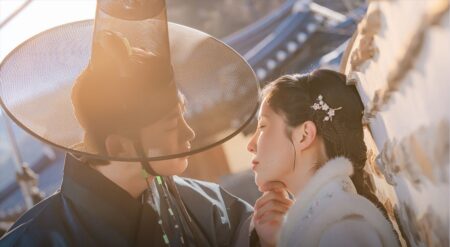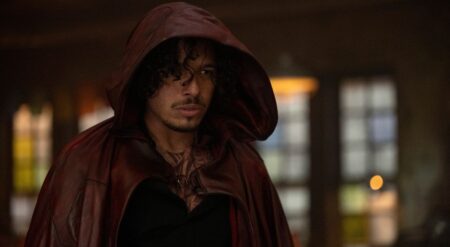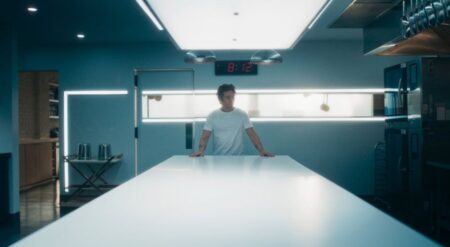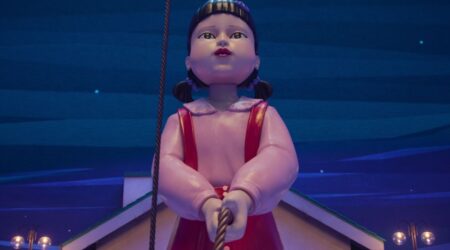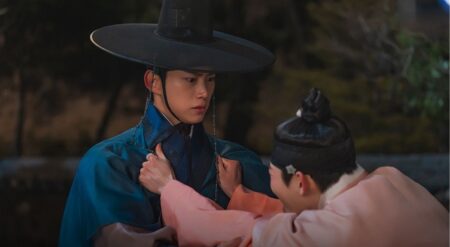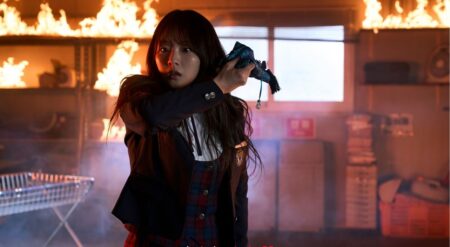Doctor Who: The Giggle is the third and final special commemorating the 60th anniversary of the sci-fi show. Written by Russell T. Davies and directed by Chanya Button, the special stars David Tennant, Catherine Tate, and Neil Patrick Harris. In this special, the Doctor is reunited with the Toymaster, an elemental force that he first met several lifetimes ago. The Toymaster has laid down a trap from 1925 in London that will drive the whole world insane.
Despite a brief opening in 1925, the special continues this trilogy right after the previous episode ended, giving the Doctor time to take in the chaotic situation. Londoners are tearing each other apart, all possessing the violent desire that they are right. The exposition takes time to build, with multiple avenues opening up as the giggle is revealed. This special is a huge combination of history and references, merging them into present-day adventure. Davies again develops a commentary on modern-day society that doesn’t just point fingers but casts a blanket of derision over everyone. It’s a statement on rage and righteousness that resonates on several levels.
The pace is both energetic and methodical simultaneously, embracing the chaos and the creepiness of the villain. This is the first of the specials to utilize the TARDIS in movement. We encounter a sea of heartwarming, old faces. Then, through the middle of “The Giggle” comes a terrifying insert as the Toymaker is reintroduced to a modern audience; there are some unnerving displays and an emotional core to Doctor Who: The Giggle using the puppeteer and toy concepts. As an enemy, the fear factor that he could instigate isn’t fully realized, as the games are often cut short and not really explored. Even in this extended story, there isn’t enough time for him, as something far more important is happening within.
The Giggle is the end of a Doctor Who era and the beginning of another. Throughout the episode, references are made to the Doctor looking old, tired, and never stopping. The inclusion of old companions is often the sign of the end. Davies and the social media team of Doctor Who have been excellently building up to it. With the Doctor stuck in the lair of the Toymaker, he and Donna are shown a puppet show of those he has lost. Cleverly, it starts from the time after Tennant’s first regeneration into Matt Smith. It is a beautiful piece of recognition from Davies, a journey that exposes both loss and hope and the tragedy and tenacity that Steven Moffat and Chris Chibnall instilled through their tenures as showrunners. It reminds us that although Tennant’s face has returned, a whole set of lifetimes were lived and filled with grief.
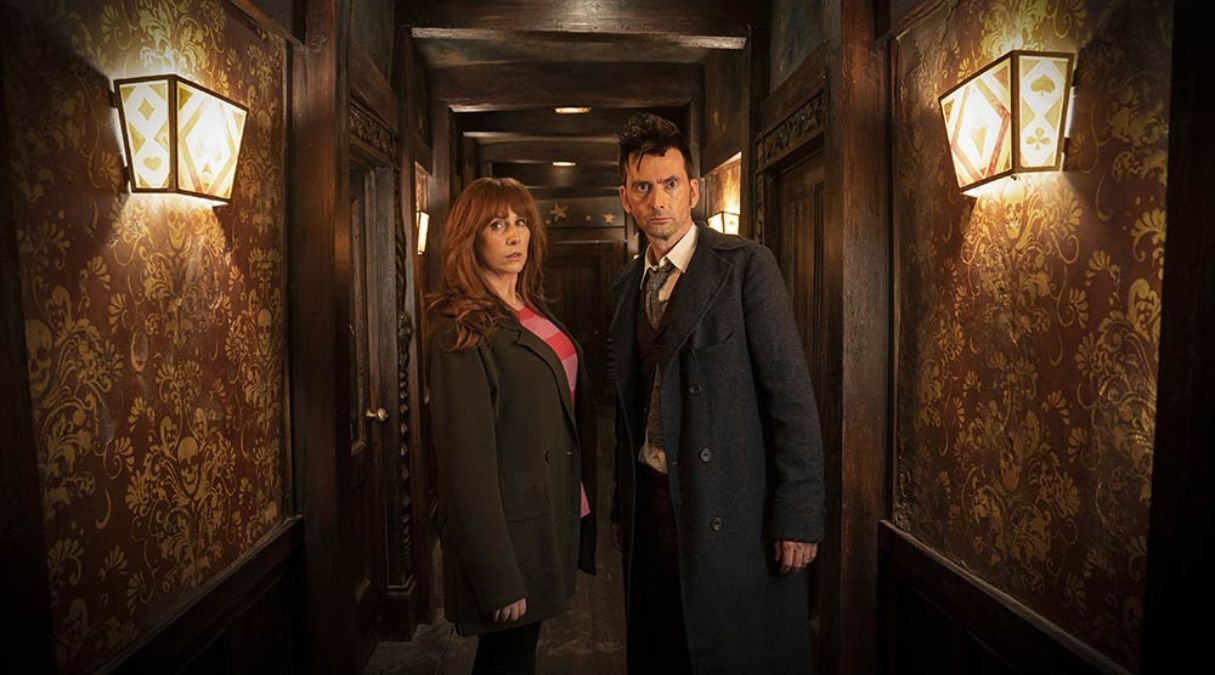
We knew there would be a regeneration in this episode; it is tradition. But the point in which it happens is shocking, and especially what comes after. It’s a revelation that shatters any preconception. It energizes not just the episode but the show as a whole and provides dual endings. It is bizarre and chaotic, which is to be loved and admired, especially as it will anger people. However, the final showdown was disappointing, lacking real power and drama.
The performances are outstanding throughout Doctor Who: The Giggle. In his second swan song, Tennant is tremendous. Joy, rage, fear, and devastation are all rolled into one with him. The love he has for everyone around him is always filled with warmth. He can unleash rage and sadness better than almost anyone, with some agonizing moments halfway through the episode. Noticeably, he looks older as the story progresses, gradually getting more exhausted. That is a benefit of not de-aging the actors; it allows for an acknowledgment of the passage of time. He can be playful, too, which blends nicely into the ancient being’s personality. But, when that legendary fury of his is unlocked, all of those around him know to stand well back.
Davies has expertly dug into deep Doctor Who lore for the enemies of this special. The Toymaker is from many decades ago and is terrifically played by Harris. Similarly to how he acted in A Series of Unfortunate Events, he brings within an exuberant, positive malevolence. He’s playful as he’s committing horrible torment, dancing as he slaughters. The ambivalence towards life is terrifying. He’s a great antithesis to the Doctor, being only a vessel for a massively powerful force of nature. That kind of untouchable power is not often seen within Doctor Who, and how that affects the world is interesting.
Around the Doctor is a quarter of amazing, brilliant women. At his side is Donna, his best friend. Davies uses the character beautifully as she draws the truth from the Doctor. She doesn’t relent in asking the tough questions. There is also an immense bravery in her unwillingness to leave the Doctor even if it leads to her demise.
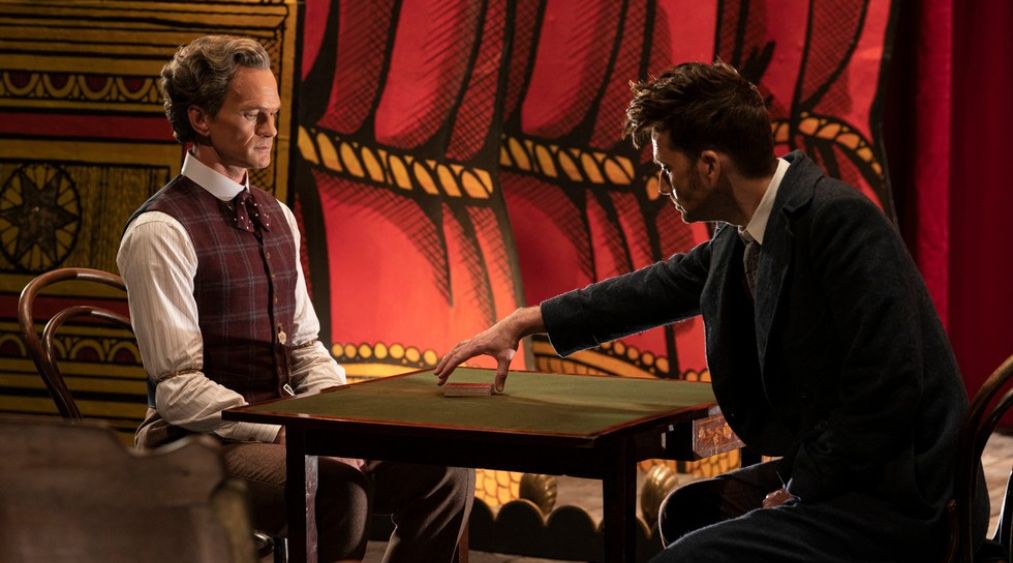
Also returning is Kate Lethridge-Stewart (Jemma Redgrave), now possibly an ally to more Doctors than any other character in history. She has been a constant rock and connection on Earth. The new scientific advisor, Shirley (Ruth Madeley), is another gem, beautifully performed. It is extremely lovely to see Bonnie Langford return as Melanie and be pivotal to the story—those connections to Classic Who will always be welcome and important. But the newcomer also instantly grabs the attention with their energy and their presence.
Visually, the show continues to be extremely impressive. New locations, both in the past and present, demonstrate the eternal and updated creativity of the production department. The new UNIT Headquarters is similar to Stark Tower, but the show can now create such a construct, which is remarkable. Then comes the 1925 London, only briefly seen but masterfully presented. The Toymaker’s lair includes a mixture of creepy special effects and horrifying toys. The only negative about them is that they warrant their own longer episode, not just a 15-minute segment.
“The Giggle” allows for a twilight, sunset, and new dawn for Doctor Who. It is zany and breaks all the rules, with chaotic set pieces and a terrific final act for one of Doctor Who‘s best actors. Davies ensures that this isn’t simply another emotional wreck as Tennant faces his second regeneration (technically third). It’s still a goodbye, and the tears will come for different reasons.
It should be remembered that this has also served as a culmination of Donna’s story, which was hovering over a tragic hair-trigger for so long. All the episode needs is more scary stuff, as it felt like the Toymaster only teased at what he could do. The show heralds what feels like the end of a huge era that includes everything from 2005 to now. All that weight and pain, from the Time War to Flux, bears down on the Doctor in his final moments. This seems like a love letter to all of those years from Davies. With that said, Ncuti Gatwa may have been given a fresher start than any of his predecessors, even after 60 years.
Doctor Who: The Giggle is available on BBC iPlayer and Disney+ outside the UK.
Doctor Who — "The Giggle"
-
Rating - 7.5/107.5/10
TL; DR
“The Giggle” allows for a twilight, sunset, and new dawn for Doctor Who.


